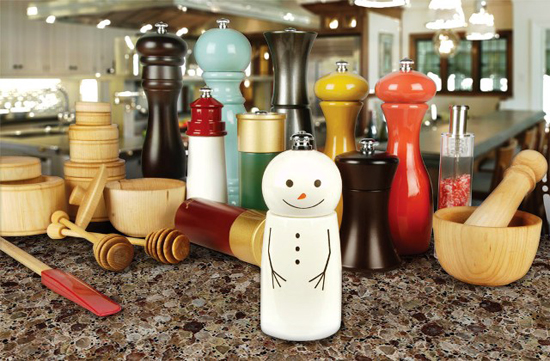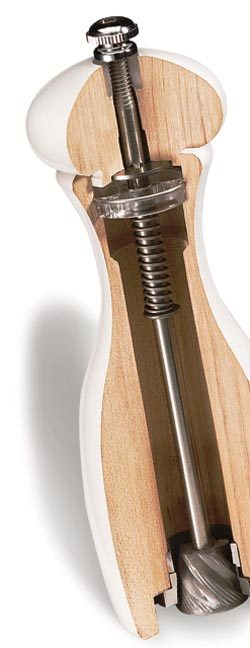Read Time: 5 Minutes Subscribe & Share
The Real Thing
 I don’t fling around the “Buy Made In America” phrase very often thanks to our less-than-stellar reputation for producing superior products. But that said, we have a Cinderella story here about pepper and salt mills produced on home turf by a family-owned company in New England. Its story starts with a famous classical percussionist for the Boston Symphony. To guarantee a supply of drumsticks (not the chicken variety) that met his exacting specifications, Vic Firth had to rescue a wood-turning company in Maine. He invested in new technology, training, and designs, and the improvements hugely enhanced not just drumsticks but all the company’s products. Their salt and pepper mills emerged superior to those La Cuisine was getting from France. We were so ecstatic after testing them that they eventually became the only ones we sold after consistent disappointing results from other manufacturers. Before Firth’s death in 2015, the gourmet operation was sold to Fletchers’ Mill, where the same wood pepper and salt mills as well as rolling pins continue to be meticulously crafted. And Fletchers’ Mill has continued to improve the design, finishes, and engineering of these mills that are indeed beautifully made in the US.
I don’t fling around the “Buy Made In America” phrase very often thanks to our less-than-stellar reputation for producing superior products. But that said, we have a Cinderella story here about pepper and salt mills produced on home turf by a family-owned company in New England. Its story starts with a famous classical percussionist for the Boston Symphony. To guarantee a supply of drumsticks (not the chicken variety) that met his exacting specifications, Vic Firth had to rescue a wood-turning company in Maine. He invested in new technology, training, and designs, and the improvements hugely enhanced not just drumsticks but all the company’s products. Their salt and pepper mills emerged superior to those La Cuisine was getting from France. We were so ecstatic after testing them that they eventually became the only ones we sold after consistent disappointing results from other manufacturers. Before Firth’s death in 2015, the gourmet operation was sold to Fletchers’ Mill, where the same wood pepper and salt mills as well as rolling pins continue to be meticulously crafted. And Fletchers’ Mill has continued to improve the design, finishes, and engineering of these mills that are indeed beautifully made in the US.
An Old-Fashioned Start-Up
Two brothers, Wayne and Earl Fletcher, mortgaged their homes in 1971 and negotiated the ownership of an antiquated wood mill in New Vineyard,  Maine. Wayne’s sons, Doug, Gary, and Jody, have owned and operated the business since 1994 after working at the company for years. Each had slowly graduated from sawmill worker, to machine operator, to mechanic, to supervisor. Today with their hard-earned expertise, the Fletcher brothers employ 100 people at their factory, producing first-rate grinders, rolling pins, and some wood kitchen utensils.
Maine. Wayne’s sons, Doug, Gary, and Jody, have owned and operated the business since 1994 after working at the company for years. Each had slowly graduated from sawmill worker, to machine operator, to mechanic, to supervisor. Today with their hard-earned expertise, the Fletcher brothers employ 100 people at their factory, producing first-rate grinders, rolling pins, and some wood kitchen utensils.
Today the Fletcher family business has its own modernized sawmill with six kilns for drying and seasoning the wood. Logs are purchased from local loggers and shaped into boards, squares, and dowels. The wood is then turned or molded into the grinders, rolling pins, and smallwares that have made Fletchers’ a byword for quality.
Sustainably Made And Guaranteed
Fletchers’ Mill is one of a handful of US companies supporting sustainable forest practices within their supply chain. Sustainability may have a higher price tag, but it has a positive impact on workers and surrounding communities, including a better economic and environmental impact. In addition, Fletchers’ Mill recycles all of their wood waste and wood generated from the manufacturing process.
 But in the end, the proof is in the design and engineering of their mills. While their salt and pepper mills have a very comfortable feel and pleasing designs, the big difference between theirs and others is inside. Simply turn the mill over and look at the grinding mechanism.If the mechanism is stainless steel, then it is a pepper mill. The stainless steel mechanism is designed for grinding pepper and has a unique two-step “Lock & Grind” system, which first cracks the peppercorns and releases the oils. It then grinds them to your chosen consistency. Fletchers’ mills give you a wide range of grinds, from cracked pepper for Steak Au Poivre to a fine powder for pasta. You turn the mill counterclockwise for coarser grinds, and clockwise for finer grinds. But, if used for salt, the stainless steel would corrode over time.
But in the end, the proof is in the design and engineering of their mills. While their salt and pepper mills have a very comfortable feel and pleasing designs, the big difference between theirs and others is inside. Simply turn the mill over and look at the grinding mechanism.If the mechanism is stainless steel, then it is a pepper mill. The stainless steel mechanism is designed for grinding pepper and has a unique two-step “Lock & Grind” system, which first cracks the peppercorns and releases the oils. It then grinds them to your chosen consistency. Fletchers’ mills give you a wide range of grinds, from cracked pepper for Steak Au Poivre to a fine powder for pasta. You turn the mill counterclockwise for coarser grinds, and clockwise for finer grinds. But, if used for salt, the stainless steel would corrode over time.
The salt mills have a nylon mechanism with the same “Lock & Grind” system for variable granularity as the pepper version. Only use dry salts, such as Maldon or La Baleine, and not a damp coarse crystal such as the French Sel du Guerande. If you prefer a salt shaker, Fletchers’ makes several models to match most of their pepper grinders. Their newly designed crown nuts are engraved with “P” or “S” and have a taller knurled grip which makes it easier to adjust the grind, particularly if you have trouble with your hands. Check out their videos on filling their mills and cleaning them for years of use. And yes, Fletchers’ Mill does replace their fabulous grinding mechanisms free of charge. Mine is over 15 years old and still grinds with the same gorgeous guts.
Their Rolling Pins Are A Bonus
In the early years of La Cuisine, we used to get really nice rolling pins from France in boxwood and beechwood. We watched with regret the gradual decline in workmanship, kiln drying, and finish. We greeted the rolling pins from Fletchers’ Mill with even more excitement than the mills (Cuisinettes spent more time rolling out cookies than grinding pepper). All Fletchers’ pins are crafted from solid rock maple and are used with equal joy by professional and home cooks. They have generous ridged handles (to help you maintain your grip), with steel ball bearings and roller weight that do the work for you as you bear down. The American-style pins are available in 10″, 12″, 15″ and 18″ lengths (not including handles). Diameters range from 2.25 inches to 2.75 inches. You might be tempted to buy a 10-inch one, but remember that a wider roller will accomplish more per stroke than a smaller one.
![]()
![]() Fletchers’ versions of two French-style pins are superb. The bakery version is 18.5 inches in length and is the rolling pin I use the most. The tapered pin, which they call a French Pin, is 20 inches long and is my pin of choice for working really thin pastry crusts and super-thin cookies and crackers. The thick middle section with its tapered ends really does keep the dough from being too thin and cracking at the exterior, and it will roll out the middle so that it is as thin as paper. They recently produced a 7-inch rolling pin for children, which I am tempted to purchase as I have two grandsons who love the rolling part of baking (although not for very long!)
Fletchers’ versions of two French-style pins are superb. The bakery version is 18.5 inches in length and is the rolling pin I use the most. The tapered pin, which they call a French Pin, is 20 inches long and is my pin of choice for working really thin pastry crusts and super-thin cookies and crackers. The thick middle section with its tapered ends really does keep the dough from being too thin and cracking at the exterior, and it will roll out the middle so that it is as thin as paper. They recently produced a 7-inch rolling pin for children, which I am tempted to purchase as I have two grandsons who love the rolling part of baking (although not for very long!)
Fletchers’ Mill is currently offering a discount to Kitchen Detail readers on an initial purchase. To use your one time 10% discount use the code NANCY10 in the promotional code field when you check out from their website This promotional code for KD readers is good through April 30, 2019.

Kitchen Detail shares under the radar recipes, explores the art of cooking, the stories behind food, and the tools that bring it all together, while uncovering the social, political, and environmental truths that shape our culinary world.





Comments are closed here.
Follow this link to create a Kitchen Detail account so that you can leave comments!